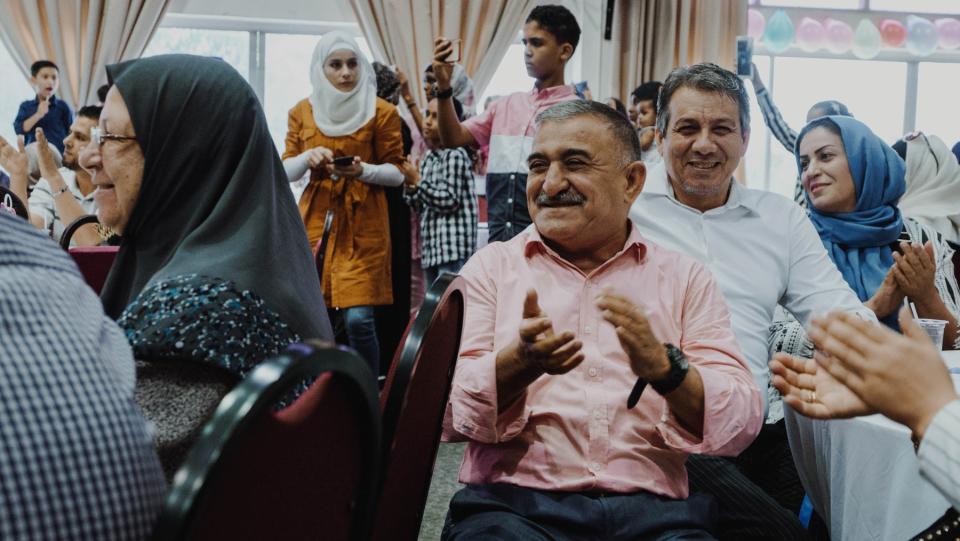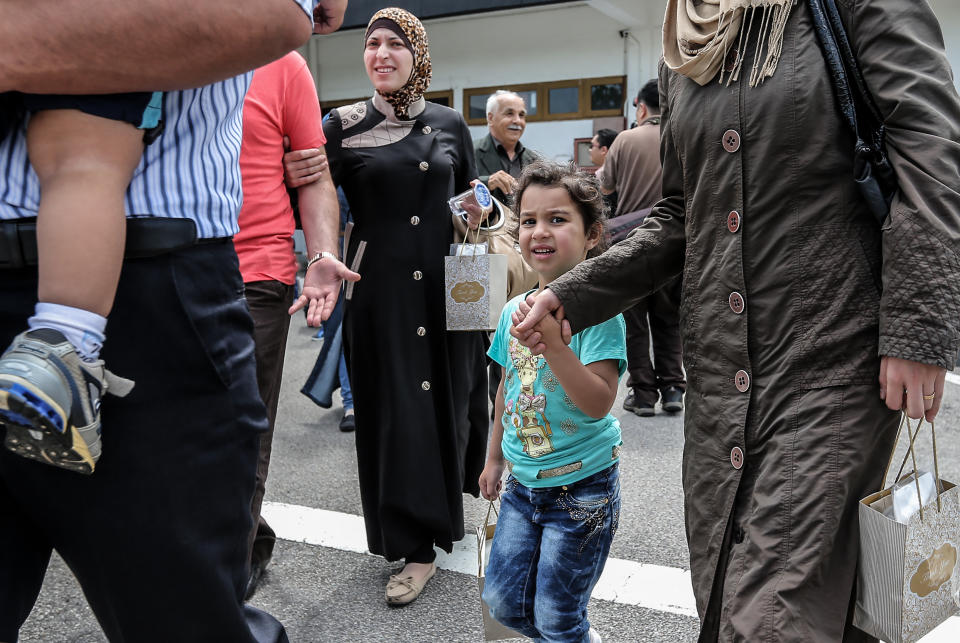Helping refugees: Singaporean-Syrian partnership made in Malaysia

SINGAPORE — It all began in February 2017 when Singaporean Nur Farhana was looking for a worthy cause to volunteer with before enrolling into university.
Then she came across the story of Hasan Al-Akraa, a Syrian refugee in Kuala Lumpur, on the Our Better World community blog.
Fleeing the violence in Aleppo with his family of eight, Hasan came to Malaysia in 2012, aged 12, and speaking only Arabic. By 2016, he had learnt English and Bahasa Malaysia and become a volunteer teacher at a refugee school. He was also organising numerous events and activities in aid of refugees.
Hasan, now 20, is currently studying for a degree in education at a branch of the University of Nottingham in Semenyih, Selangor, under a scholarship scheme for refugees.
“He was so young and already contributing so much, even as a refugee himself. And I found that very inspiring,” recalled Farhana, now 22. “So I told myself, I have to get in touch with this boy.”
Two years later, the duo now run the Al-Hasan Volunteer Network (AHVN), which runs more than 10 different projects assisting refugees in Malaysia. These include providing language and soft skills classes and dry food for those in need, often in collaboration with non-governmental organisations and companies.
Over the years, AHVN has mobilised some 500 volunteers on an ad-hoc basis, according to Hasan. It is not an officially registered organisation, partly due to his status as a refugee. Refugees in Malaysia have no legal status and are unable to work legally or receive a state education, among others.
“At first, I thought she was like fooling me. Someone wanted to come all the way from Singapore just to volunteer?” said Hasan. “But she seemed to be very passionate and really wanted to help.”
The very first project they worked on together? A free flea market.
“I left for Kuala Lumpur with three huge boxes of clothes, books and toys,” said Farhana, who stayed for a couple of months with a single refugee mother and her six children. “I did not speak any Arabic and the whole family only speaks Arabic. So we communicated by sign language.”
A partnership that clicked

Farhana admitted to being “shocked” when she first met Hasan. “He was doing everything alone. He told me that sometimes he reaches this point of burnout. So that was kind of how we decided that it's probably good to have a team that we can count on as well.”
Drawing on her experience of organising big-scale events from school and work - she now works in the media industry - and her background in mass communications, Farhana got Hasan organised.
The duo then started AHVN in April 2017. They currently work with a committee of seven other volunteers based in Singapore and across the Causeway. Hasan told Yahoo News Singapore, “When we first met, I had a lot of events and projects, but I wasn't organised. (For example), I didn’t have a system of recruiting volunteers.”
“Farhana has contributed a lot to the work I do, in terms of improving it and making it more organised so that it can reach to more people in terms of donors, as well as beneficiaries.”
And there is much work to be done. As of end-July 2019, there are some 178,010 refugees and asylum-seekers registered with the United Nations High Commission for Refugees (UNHCR) in Malaysia, with many more unregistered.
More than 150,000 are from Myanmar, while some 3,000 come from Syria. According to UNHCR figures, some 70.8 million people worldwide have been forcibly displaced.
According to non-profit organisation Shelter, there are no refugee camps in Malaysia and as such, refugees live around the country, mostly in Klang Valley. They live in low-cost apartments, near construction sites, and in temporary camps in jungles near Selangor. Hasan’s family is currently living in Ampang, a town in Kuala Lumpur.
Besides the occasional donor, AHVN solicits funds and other donations via crowdfunding. Much of the work is done through an informal network via a WhatsApp group.
“Inside that group are donors, some influential people and networks. So every time there is an emergency case, since people really trust the branding of AHVN, they reach out to Hasan,” said Farhana.
“It could be a delivery, it could be someone who needs a prosthetic leg. So they reach out to us and we blast it out on AHVN and the group chat and then we get donations.”
Overcoming prejudice
Hasan’s story has become well-known in Malaysia - he has been interviewed by Malaysian media outlets and also delivered numerous talks at universities, conferences and events such as TEDx. Nevertheless, Hasan said that refugees experience more than their fair share of “discrimination and judgment”.
“A lot of people think that we are here to steal jobs, we are here to marry a local, we are here to resettle, we are here to bring problems and fights to the country.”
He added, “A lot of refugees are highly educated. Some of them are engineers, nurses, teachers. And Malaysian society doesn't see them as these people, they see them as refugees who are useless and, and have no talents or nothing.”
Malaysia is not a signatory to the 1951 Refugee Convention, which defines the term ‘refugee’ and outlines the rights of the displaced, as well as the legal obligations of states to protect them. The country does not differentiate between undocumented immigrants and refugees
For Farhana, who goes to Kuala Lumpur every two to three months, working with AHVN has opened her eyes to the plight of refugees. “The more I spoke to the people, the more I understood how terrible this whole refugee crisis (is and) how dire it has been.
“When you speak to children and they tell you about their stories about what happened to their families, they cannot even shed tears, because it's so normal to them.”
But she has found much inspiration from working with Hasan. “He is the kind of person who is not afraid to do things first. So whenever he sees that there is a problem or an issue, he does not hesitate to dive head-in first, and then along the way, he will plan. He always thinks about the beneficiaries first. “
‘Before the war started’

Asked about his life in Syria before the civil war broke out, Hasan recalled an idyllic life in a big house on a farm, which produced olive oil and reared livestock like chickens, sheep and cow, surrounded by family and friends.
“We were a middle-income family. We ate eggs every day and we very rarely went to the market,” recalled Hasan, who is one of five children. He spoke of having “dignity” and an identity.
Before the war started, Syria was peaceful, just like in Singapore and Malaysia, according to Hasan.
“So one day, when the war started and it reached Aleppo, we started seeing bombs flying above our house and hitting the village right next to us. We saw a lot of destruction. A lot of people started dying, including some of my relatives.”
Hasan also recounted the story of a Malaysian family whom his family got close to, when they lived in Damascus in 2006. The Malaysians were facing financial issues, so Hasan’s family gave them free lodging. “We became very close, like one family.”
The kind gesture shown by Hasan’s family in Syria was repaid in Malaysia about six years later.
When Hasan’s family first arrived in Malaysia, the Malaysian family were at the airport to welcome and bring the Syrians to their house in Ampang. Hasan’s family stayed at the house for three weeks.
He added, “So I always tell this story to my friends, especially those who are from Malaysia. And I tell them, the lesson from this story is that when you see someone who needs help, just help. Do not look at their race, their nationality, their religion, just help for the sake of helping because you never know what what might happen to you tomorrow.”
Related stories
2 Singaporeans tell stories of Afghan child refugees in Indonesia
COMMENT: Singapore immigration debate echoes global trend
Going South: North Korean defectors face hardships, prejudice and hope in new life


